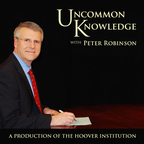
Uncommon Knowledge — audio edition
Summary: Uncommon Knowledge is a production of the Hoover Institution, a public-policy research center devoted to the advanced study of politics, economics, and political economy — both domestic and foreign — as well as international affairs. Topics on Uncommon Knowledge range from the legalization of drugs to affirmative action to war to taxes to censorship on the Internet. Uncommon Knowledge is hosted by Hoover fellow Peter M. Robinson.
- Visit Website
- RSS
- Artist: Peter Robinson
- Copyright: Copyright © 2014 by the Board of Trustees of the Leland Stanford Junior University
Podcasts:
Summary not specified
Utah Republican senator Mike Lee joins Peter to discuss the positive reforms he has put forth since being elected in 2010. The senator's legislation caused the New York Times to refer to him as the "one-stop shop for provocative reform ideas." Senator Lee explains his policies to restructure the tax code, change transportation funding, and how to move immigration forward. Senator Lee, before becoming a senator, clerked for Supreme Court justice Samuel Alito, served as an assistant US attorney in Salt Lake City, and practiced law with large firms in both Salt Lake City and Washington, DC.
Summary not specified
This week on Uncommon Knowledge, military historian Max Boot discusses current events in Syria, Iran, and his recent book Invisible Armies: An Epic History of Guerrilla Warfare from Ancient Times to Present. Boot explains how guerrilla warfare has been, and still is, the most common form of conflict even today, as seen in Syria and Afghanistan. Since conventional tactics do not work for unconventional armies, Boot offers lessons to be learned and applied to today's battles. Boot further argues that now it is more important than ever to understand the history and operation of insurgent forces.
In this special episode of Uncommon Knowledge, host Peter Robinson remembers Christopher Hitchens, a British American author, journalist, and personal friend, through a series of excerpts from past interviews on Uncommon Knowledge. These excerpts cover discussions of Marxism, the Vietnam War, the Civil Rights Movement and the Great Society, Iraq and the Middle East, the war on terrorism, and the history of the American Left.
Summary not specified
This week on Uncommon Knowledge, playwright David Mamet discusses his book The Secret Knowledge: On the Dismantling of American Culture and his conversion to conservatism. Mamet explains how, by studying Jewish and Christian texts such as the Talmud and the Bible, he came to approach arguments from a new perspective that aligned itself with conservative politics. Throughout the interview, Mamet discusses his newly found conservative position on several issues, including social justice and civil rights, the decline of the family and the sexual revolution, affirmative action and race, and domestic politics and foreign policy.
This week on Uncommon Knowledge, Archbishop Gomez of Los Angeles discusses Catholicism, Mexico-US relations, and immigration, which, as a prominent issue in the United States, provokes a wide variety of opinions as to how it can best be addressed. Gomez argues, both in the course of the interview and in his book Immigration and the Next America, that those who come to the United States from Mexico are honest people looking for work. He points out that this pattern is consistent with the role of immigration in the historical relationship between the United States and Mexico and that, historically, immigrants do not supplant the existing culture but integrate within a generation.
Summary not specified
This week on Uncommon Knowledge, host Peter Robinson mediates a discussion between PayPal founder and Stanford Professor Peter Thiel and Velocity Capital Management founder and journalist Andy Kessler on the state of technology and innovation in the United States over the past four decades. Thiel argues that, outside of computers, there has been very little innovation in the past forty years, and the rate of technological change has significantly decreased when compared to the first half of the 20th century. In contrast, Kessler asserts that innovation comes in waves, and we are on the verge of another burst of technological breakthroughs. Industries covered include education, medicine and biotechnology, as well as robots and high tech.
Amity Shlaes sheds light on the life of Calvin Coolidge, the thirtieth president of the United States. The harsh conditions of Coolidge’s childhood shaped his political ideas and led to his deep understanding of life and helping people succeed, especially in business. Believing in small government and low taxes, he thought government needed to get out of the way so individuals and businesses could prosper. His supply-side economics were a resounding success, with an unemployment rate of 5 percent or even 3 percent, as the economy grew and the government shrank.
Victor Davis Hanson discusses his book The Savior Generals: How Five Great Commanders Saved Wars That Were Lost—From Ancient Greece to Iraq. Hanson notes that savior generals are eccentrics, iconoclasts, and visionaries who see things others do not.
Tom Wolfe discusses the ideas and inspirations for Back to Blood, a story of decadence and the new America. In the book, Wolfe paints a story of a decaying culture enduring constant uncertainty. Heroes are spurned and abused, and values are dissolving; yet the message seems to be to stick with the good values.
This week Uncommon Knowledge, brings us interview excerpts from two former secretaries of state and Hoover fellows Henry Kissinger and Condoleezza Rice, and former secretary of defense Robert McNamara. All three have influenced American foreign policy through the years and through different crises, and all three believe that the United States possesses a particular responsibility in the world.
Senator Rand Paul discusses his political ideas, ideals, and philosophies, noting that "we're all born with an instinct towards individualism." He gives his insights into dealing with immigration, unemployment, foreign policy, national security, taxes, personal responsibility, and many other issues.